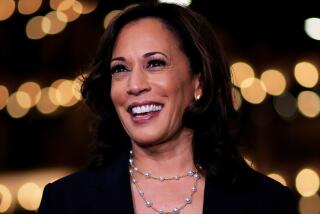Bush’s Green Wave
- Share via
George W. Bush appears headed toward nomination by acclamation when the Republican presidential convention gets underway July 29 in Philadelphia. That’s partly because most GOP party pros smell a winner in the Texas governor, and winning back the White House is what it’s all about. But it’s also partly because the astonishing $52 million in campaign contributions that Bush has already attracted, with more to come, has kept most of his opponents for the nomination from raising the money they need to campaign effectively. Leaving aside the self-financing multimillionaire Steve Forbes, Bush is in the happy position of being able to outspend all of his opponents combined.
On Monday former Vice President Dan Quayle dropped out of the GOP race, citing himself as a victim of Bush’s success in pulling in big bucks. Had he been able to raise more money there’s no doubt Quayle would have stayed the course longer, as would have former Tennessee Gov. Lamar Alexander, the first of the major GOP contenders to withdraw. Granted, many also see Quayle as being severely handicapped by his reputation, frequently reinforced, for saying things that limit his claim to be taken too seriously. But the point he made Monday is a fair one: “An unprecedented front-loading of the primary system” is making it all but impossible for candidates other than Bush to continue the quest for convention delegates.
There’s nothing remotely illegal or unfair about Bush’s money-raising. A lot of Republicans clearly prefer him for president, and they have every right to back their choice with their checkbooks. If Bush wins the nomination it will be because he amassed the delegate strength in the primaries that he needs at the convention. Of course, it’s a lot easier to sweep up those delegates if other candidates have been driven from the field or seen their campaigns effectively pauperized before the key primaries are even held.
So what appears to be shaping up is a series of Republican presidential primaries that could be contested only nominally, if at all. This has happened before, in both major parties, though it’s hard to think of another example where one candidate’s ability to corral money so dominated the course of events. Bush is a public figure whose policy views for the most part remain cloaked. But he might be close to preempting his party’s nomination, meaning that GOP voters in most of next year’s primaries wouldn’t even have the option of making a choice.
More to Read
Get the L.A. Times Politics newsletter
Deeply reported insights into legislation, politics and policy from Sacramento, Washington and beyond. In your inbox twice per week.
You may occasionally receive promotional content from the Los Angeles Times.










